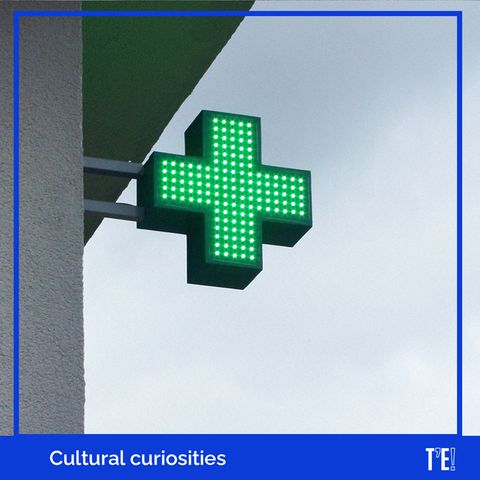Hello and welcome to this podcast brought to you by That's English!, the Spanish Ministry of Education's official distance learning English course. To find out more about That's English! go to www.thatsenglish.com or contact your local Official School of Languages. Today we are going to talk about the language we might need if we go to a chemist's. When you are travelling in the UK, you may have some minor health problem and need to visit the chemist's. We would like to help you out with common vocabulary that you might need in this type of situation. In the UK, the two most well-known chemists are Boots and Superdrug. You will probably be surprised when you walk into these stores, as apart from selling pharmaceutical, health and cosmetic products, they have many other kinds of items. If you need to speak to the chemist, you must look for a sign that says 'Prescriptions', as this is the department within the shop where you will be able to ask for advice and buy a prescription, as the case may be. Perhaps one of the most common illnesses for any traveller are problems related to the stomach and digestive system, either because you have diarrhoea and can't stop running to the bathroom, or because of just the opposite, that is, you can't go to the bathroom at all. The latter means that you are constipated. This is one of the best known 'false friends' between English and Spanish, as if you are constipated, it does not mean that you are 'constipado'. Remember that, in this case, in English, you say you have a cold. So, if you can't stop going to the toilet, you need to ask the chemist for a medication for diarrhoea and if you are constipated, you will need to ask for a laxative. If you have a cold, the pharmacist will probably ask you to explain which symptoms you have: Do you have a temperature? If you say that you do, they will want to know how high it is. Let's imagine that you have had a temperature of 38.5˚C for 2 days. You might have a headache, a blocked nose - meaning that you can't breathe, or a runny nose, which means that you are constantly having to wipe your nose with a paper handkerchief. You might have a sore throat and have difficulty swallowing, or you may even have lost your voice. Maybe your whole body aches. If you are unlucky, instead of having a cold you might have the flu. The chemist will probably give you a cold or flu remedy, with either paracetamol or aspirin. If you have a cough, they will ask you if it is a dry cough or a productive cough with mucus. Depending on which type you have, they will give you a different type of cough mixture. For your sore throat, they may give you throat lozenges to suck, and for your blocked nose, a nasal spray. Another common ailment might be an allergy. If you are allergic to pollen, we call this hay fever and you may need to take antihistamine tablets or even use an inhaler if you have difficulty breathing. If you have been bitten by a mosquito or a mozzie, as they are called colloquially, or you have a wasp or bee sting, you may have to ask for an antihistamine cream to put on the place where you have been stung or bitten. Likewise, if you have a rash - an irritation of the skin - the pharmacist will also recommend an appropriate skin cream. Other kinds of medicinal products that you might need to ask for, or look for on the shelf at the chemist's, are plasters and an antiseptic for small cuts or for foot blisters, which can be quite common when a tourist walks for miles seeing the all the sights. If you have a more serious illness, you may have to see a doctor or GP, which is short for general practitioner. According to the website of the UK's public health service - the NHS - you can receive emergency treatment from a GP surgery for up to 14 days when visiting the country. For a longer period of time, you would have to register with a doctor. Finally, if you have an accident or need emergency medical attention, you will need to go the A&E (Accident and Emergency) department in the nearest hospital or dial 999 for an ambulance. In any case, you will find a lot more information on the NHS website: www.nhs.uk. We hope you have found this podcast interesting and wish you happy, healthy travelling! We hope you have enjoyed this podcast, brought to you by That's English! Please follow us on Facebook and Twitter. We look forward to hearing from you. Bye for now!
show less

